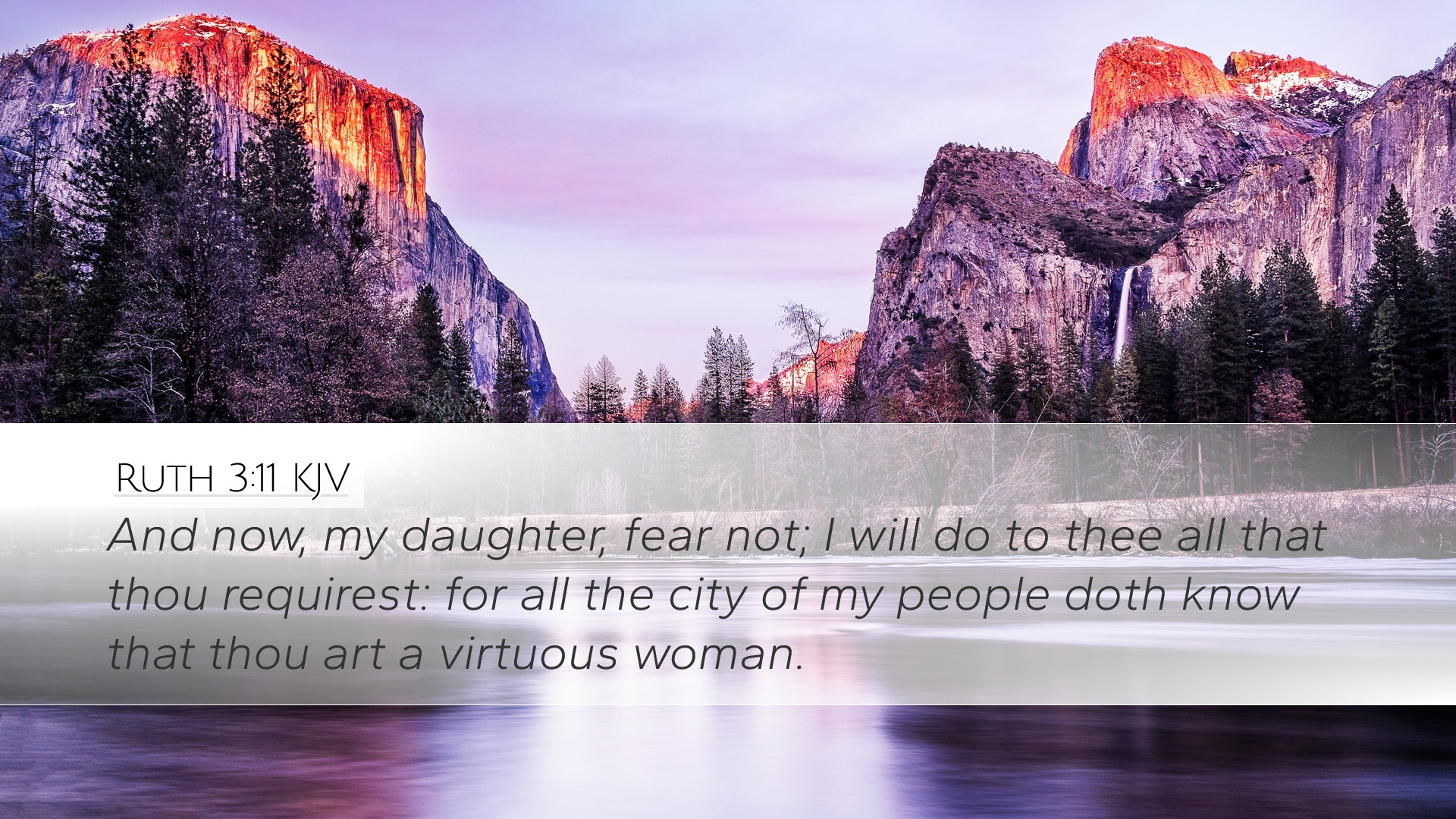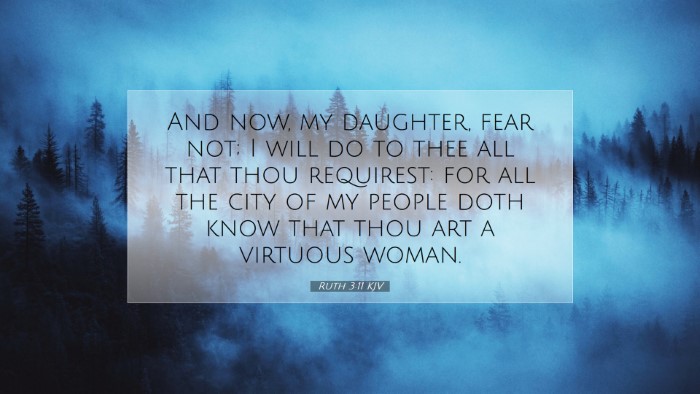Old Testament
Genesis Exodus Leviticus Numbers Deuteronomy Joshua Judges Ruth 1 Samuel 2 Samuel 1 Kings 2 Kings 1 Chronicles 2 Chronicles Ezra Nehemiah Esther Job Psalms Proverbs Ecclesiastes Song of Solomon Isaiah Jeremiah Lamentations Ezekiel Daniel Hosea Joel Amos Obadiah Jonah Micah Nahum Habakkuk Zephaniah Haggai Zechariah MalachiRuth 3:11
Ruth 3:11 KJV
And now, my daughter, fear not; I will do to thee all that thou requirest: for all the city of my people doth know that thou art a virtuous woman.
Ruth 3:11 Bible Commentary
Commentary on Ruth 3:11
Ruth 3:11 states: "And now, my daughter, do not fear. I will do for you all that you ask, for all my fellow townsmen know that you are a worthy woman." This passage occurs in a pivotal moment within the book of Ruth, encapsulating themes of loyalty, honor, and divine providence.
Contextual Overview
The book of Ruth, set during the time of the Judges, is a narrative underscoring God's faithfulness amid societal chaos. Ruth, a Moabite widow, demonstrates profound loyalty to her Israelite mother-in-law, Naomi, and her bold actions throughout the text reveal significant theological implications.
Detailed Commentary
Matthew Henry's Insights
Matthew Henry emphasizes the virtue of Ruth as a "worthy woman," signifying that her integrity and character won the heart of Boaz. He underscores the importance of reputation in biblical times, where one's character was paramount, and the endorsement from the townsmen reflects Ruth’s noble status.
- Character Assessment: Henry points out that Boaz's acknowledgment of Ruth as a worthy woman not only affirms her personal qualities but also illustrates the wider community's recognition of her virtue. This communal acknowledgment is indicative of God's providence in aligning Ruth with Boaz.
- Fearlessness: Boaz encourages Ruth not to fear, indicating both an assurance of his intentions and a reassurance of God's overarching plan for her life.
- Loyalty Rewarded: The commentary reveals how Ruth's loyalty to Naomi and her proactive nature in seeking Boaz's favor demonstrate virtuous qualities that lead to her eventual redemption and establishment within the Israelite community.
Albert Barnes’ Perspective
Albert Barnes notes the significance of the phrase "do not fear" as a pivotal reassurance in the narrative. He elaborates on Boaz's response and how it reflects God's faithfulness and kindness in the life of Ruth and Naomi.
- Affirmation of Worth: Barnes highlights that Boaz’s acknowledgment of Ruth as a “worthy woman” resonates deeply within the text. This title bestows honor upon Ruth and implicitly calls attention to her character, which was commendable even among the Israelites, despite her Moabite lineage.
- Community Reputation: The recognition by fellow townsmen further enhances Ruth's stature, suggesting that integrity transcends ethnic boundaries and communal prejudices.
- Divine Favor: Barnes views this moment as a manifestation of divine favor over Ruth’s life, emphasizing that her diligent and faithful character garners not only human praise but also God’s providential care.
Adam Clarke's Analysis
Adam Clarke touches upon the implications of the cultural context in which this passage occurs. His analysis provides deeper insight into the customs surrounding gleaning and the responsibilities of a kinsman-redeemer.
- Custom and Practice: Clarke asserts that Ruth’s approach to Boaz was not merely a personal request but also followed the legal customs of the time regarding levirate marriage, highlighting the significance of Boaz's acceptance.
- Sacred Consensus: The declaration of Ruth as a worthy woman implies that her character aligns with the expectations of the community, showcasing that divine virtue is often recognized at the societal level.
- Foreshadowing Redemption: Clarke discusses the redemptive narrative that Ruth's story embodies, suggesting that her righteousness prefigures God’s redemptive plan through Christ, where those deemed outsiders find acceptance and grace within the covenant community.
Theological Implications
This verse serves as a profound reminder of several theological truths:
- God's Providential Care: The circumstances surrounding Ruth's actions and Boaz’s responses reflect God’s meticulous providence in guiding His people to fulfill His divine promises.
- The Nature of True Worth: The recognition of Ruth's worth challenges congregations today to examine the metrics by which they measure value and character within their communities.
- Cultural Boundaries: God's grace transcends cultural and ethnic limitations, echoing the New Testament message of inclusion through Christ.
Conclusion
Ruth 3:11 stands as a powerful testament to the character of God as revealed through human interaction. The insights drawn from public domain commentaries such as those by Matthew Henry, Albert Barnes, and Adam Clarke highlight the profound truths embedded in this narrative, ensuring its relevance and application for pastors, students, theologians, and scholars alike.


